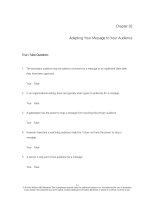Business communication building critical skill 3rd by locker module 18
Bạn đang xem bản rút gọn của tài liệu. Xem và tải ngay bản đầy đủ của tài liệu tại đây (385.53 KB, 12 trang )
PPT
PPT
Module
Module 18
18
Working
Workingand
and
Writing
Writingin
inTeams
Teams
McGraw-Hill/Irwin
©2007, The McGraw-Hill Companies, All Rights
19-2
Working
Working and
and Writing
Writing in
in Teams
Teams
To learn how to
Work in teams.
Be a productive leader.
Resolve conflicts constructively.
Write collaborative documents.
19-3
Working
Working and
and Writing
Writing in
in Teams
Teams
Start by answering these questions:
What kinds of messages should
groups attend to?
What roles do people play in groups?
How should we handle conflict?
How can we create the best coauthored documents?
19-4
Types
Types of
of Group
Group Messages
Messages
Informational
Focus on the problem or challenge, data,
and possible solutions.
Procedural
Focus on methods and process.
Interpersonal
Focus on people, promoting friendliness,
cooperation, and group loyalty.
19-5
Stages
Stages of
of Group
Group Development
Development
Orientation
Members develop social cohesiveness.
Formation
Members choose a leader and define the
problem.
Coordination
Members do most of the work; the longest
phase.
Formalization
Members seek consensus.
19-6
Positive
Positive Roles
Roles in
in Groups
Groups
Seeking Information and Opinions
Giving Information and Opinions
Summarizing
Evaluating
Coordinating
19-7
Roles
Roles That
That Help
Help Build
Build Loyalty
Loyalty
Encouraging Participation
Solving Interpersonal Problems
Relieving Tensions
Checking Feelings
Listening Actively
19-8
Negative
Negative Roles
Roles in
in Groups
Groups
Blocking
Dominating
Clowning
Withdrawing
19-9
To
To Reduce
Reduce Group
Group Conflicts
Conflicts
Make responsibilities and ground
rules clear at the beginning.
Discuss problems as they arise.
Realize that group members are
not responsible for each others’
happiness.
1910
Steps
Steps in
in Conflict
Conflict Resolution
Resolution
Make sure that the people
involved really disagree.
Check to see that everyone’s
information is correct.
Discover the needs each person is
trying to meet.
Search for alternatives.
Repair bad feelings.
1911
To
To Respond
Respond to
to Criticism
Criticism
Paraphrase.
Check for feelings.
Check for inferences.
Buy time with limited agreement.
Use you-attitude to see the other
person’s point of view.
To
To Create
Create Co-Authored
Co-Authored
Documents
Documents
Allow time to discuss problems and
find solutions.
Get to know group members.
Be a responsible group member.
Be aware of differences in seeing
things and expressing ideas.
Remember that oral agreement may
not lead to a strong written document.
1912









